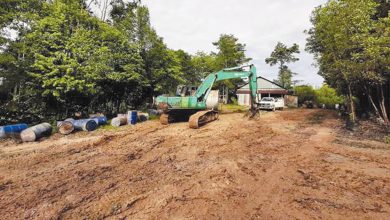When Water Becomes More Expensive Than Petrol
By Mariam Mokhtar


Not many people are aware that water, can be more expensive than petrol. Just ask the people in some parts of Selangor, or the people who live in the interior of Sarawak and Sabah, or the Orang Asli villages in peninsular Malaysia, about the scarcity of water.
In Selangor, water treatment problems, replacement of old water pipes and politics have muddied the waters when it comes to the supply of water for consumers. The problems in the interior villages may be different but they are just as difficult to resolve. Many streams which once provided these communities with fresh, clean drinking water, have been contaminated by mining, palm oil production, or logging. These activities have threatened the only sources of potable water, for many villages.
Water is needed to satisfy a basic human need but for the residents of towns and cities in Malaysia, the convenience of piped water is only appreciated when there is a water shortage.
As we read in the newspapers about water shortages and rationing in parts of Selangor, does it ever cross our minds that water rationing might occur in Perak? We only become conscious of this precious commodity when the water board informs us that they are fixing a broken pipe, and supply will be disrupted for a day. If a reservoir runs dry, because of drought, and we have to restrict water consumption, will we be prepared? Many households and businesses currently do very little to conserve water.
UN Secretary-General, Ban Ki-Moon once said, “Safe drinking water and basic sanitation are intrinsic to human survival, well-being and dignity”. Although water covers 70 per cent of the earth’s surface, only a small percentage of that water is safe and clean enough for human consumption.
In Malaysia, when it rains, it pours; but many Malaysians have the mistaken belief that they live in a tropical climate, where water is abundant. As we become more industrialised, factories and agricultural activities will continue to pollute our waterways with effluents, pesticides, fertilizers and chemical run-off. As our townships become bigger, raw sewage will be dumped into freshwater supplies and rivers, rendering them unsafe for human consumption. If sewage is discharged into the sea, it makes swimming and fishing unsafe.
There are some simple and effective ways to conserve water in the home, in the garden and in the office. Conserving water will not just preserve the environment, but these steps will also save money, in the long-run.


Indoors:
- Don’t let the water run whilst brushing your teeth. Similarly, don’t leave the tap running, when cleaning vegetables, in the kitchen.
- When washing dishes, do not let the water run continuously. If you have a double basin, fill one with soapy water to clean the dishes and fill the other with clean water for rinsing.
- Take shorter showers.
- Use a washing machine or dishwasher only when there is a full load.
- Check your plumbing and toilet for water leaks.
- Replace worn washers to prevent taps from dripping.
- Install a low flush toilet which uses less water, or convert an existing toilet to low flush by inserting a plastic bottle filled with sand or gravel, into the cistern.
- Divert water from the washing machines to the garden, and save the water from rinsing vegetables to water the plants.
- Do not fill the kettle up to its maximum level, just to make one cup of tea.
- If you boil too much water, allow it to cool, then refrigerate it for drinking.
In the garden:
- Water plants in the morning or in the late afternoon, when it is cooler. This reduces water loss due to evaporation.
- Collect rainwater in a water butt and use this for watering plants or the lawn.
- Grow drought resistant plants, which do not need much water.
- Place mulch or organic matter around the base of fruit trees, ornamental trees and plants to reduce evaporation, increase water retention, and prevent weeds from taking hold.
- Only water the lawn when necessary and use drip irrigation systems or micro hoses.
- Use buckets of water rather than a hose to clean the car.
- Clean the drive and drains, with a rake or a broom, rather than a hose.
- Group plants with similar water needs together and where possible, grow plants which are native to the area.
- Use the gel from lightly used Pampers as a water retaining gel for flower pots and flower beds.
In the office:
Turn-off taps, after use.


